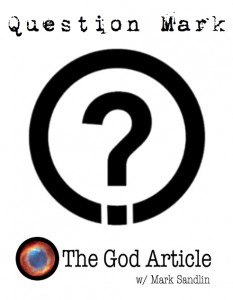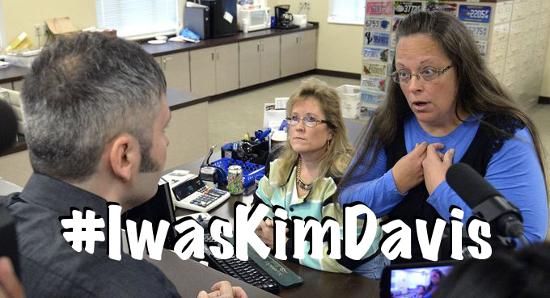Question Mark — Week of July 13
This is a new series I’m trying out on the blog.
From time to time, I’ll ask for questions on my personal Facebook page (feel free to friend request me). Based on nothing in particular, I’ll pick five of them to answer.
Admittedly, most of the questions deserve much more consideration than I can give them in a few paragraphs, but I think this could be a good place to start conversation and possibly to challenge some long held beliefs of what a Christian must believe. It might even be something you want to share on your various social media outlets in order to start conversations there.
So without further ado, I give you this week’s questions.
1) If you could distill the Gospel down to one sentence what would it be? (from Ryan Duncan)
God has told you how the world works best: Love other people, no matter what, and let your actions show it.
2) How do you define agnostic? (from Darlene Burns)
To me, an agnostic is someone who lacks enough evidence to be certain whether or not there is a God.
Following in the footsteps of Neil deGrasse Tyson who has called himself an agnostic Atheist before, I sometimes refer to myself as an agnostic Christian. The definition I just gave for “agnostic” approached it as a noun, but I think Dr. Tyson’s move to make it an adjective is much truer to its intended purpose.
For me, making it a noun gives it too much certitude and also lacks any indication of the person’s leanings. At times that may be helpful, but most of the time it is more helpful to enter a conversation understanding where a person is coming from in terms of their beliefs.
Thus, I am a agnostic Christian: “I believe. Help me in my disbelief.”
Frankly, I think far more people are some form of agnostic than care to admit it.
3) What is your go to bourbon? Put another way: If you could only buy one bottle — with price being no object — what would it be? (from Chris Muse)
My “go to” bourbon is whatever is in my glass.
I’m actually going to be more specific, but I wanted to make a point. Unlike beer and wine and even fruit juice, there really are no true bourbons that I dislike.
Are some better than others? Yes.
Do I care? A lot of the time, no.
My “go to” bottle changes every half year or so. Frequently, it’s because someone comes out with something new. Currently, that is the case. Elijah Craig’s Barrel Proof is pretty outstanding and we get a new batch every quarter. I’m a big fan. Besides, he was a preacher – how cool is that?
4) Which of the Gospels is your favorite and why? (from RoseAnn Evans)
Let’s start with the process of elimination. I’m not a big fan of John. Besides the dating which puts it further away from the time of Jesus than any of the other Gospels, it has a very high Christology that I just don’t find in the parallel Gospels. So, take it off the list of contenders for my favorite.
Matthew is a fairly legalistic, judgement oriented Gospel. When you look at the other teachings of Jesus, I find it difficult to believe there was ever this much emphasis on the “final judgement” and the “coming of Christ.” So, for me, it’s out of the favorite category as well.
We are down to Luke and Mark. This is going to be a tough one for me.
Luke is a great storyteller. I was actually part of a storytelling team all the way back in 5th grade. I have a special place in my heart for storytellers. Luke also tells us a lot more about the women in the story which I find helpful. Ultimately, though, Luke seems to favor storytelling over historical acuity. I’d say it’s good for some things, not so much for others.
That brings us to Mark. Mark has it’s own issues, but considering that there’s no other Gospels left, let me tell you what I like about it.
It’s probably the earliest dated Gospel which carries a lot of weight with me.
There’s no list of “begats” in it. I’ve always found that the list of genealogy come off as someone tying to hard to establish importance.
There’s also no birth narrative. Now that may seem like a bad thing, but with the way some Christians make the birth more important than the teachings of Jesus, I count it as a good thing.
In its original form, it ends before any of the after resurrection appearances. Yep, no zombie Jesus. Again, set in our modern context, that works for me. (If that answer disappoints you because you are into zombies, wait’ll you get a load of the last question!)
In the end, I choose my namesake: Mark. That’s my favorite Gospel.
5) How do you correlate The Walking Dead to Christianity today? (from Barb Harmon)
It’s not surprising that most viewers probably identify themselves and the groups to which they belong as the survivors on The Walking Dead (TWD). Equally, it’s not surprising that most of us identify the Walkers (the zombies) as the brainless, threatening “others” in our lives.
It’d be an easy correlation to make: The majority of people going about their “life” based purely on instinct (“belief”?), oblivious to the world around them while chasing down and “converting” those who aren’t like them.
It’d be easy. Too easy. I’m not going there.
Think of the Walkers as the trials and tribulations of life. Think of staying alive as God. All the different groups of living folk in the TWD universe are trying to stay alive. They each have different ways of doing it. They each gather together in small groups with like minded people. Clearly, they would be safer if the groups joined together, but every time they try to bring two groups together the very thing they are fighting to keep, their humanity, gets in the way.
Rather than considering the overall good, they want to insure the survival of their own more than the survival of others (even to the point of killing them).
They want their way to win out.
They want power.
In the end, it is their inability to overcome the worst of their own humanity that is killing them – not the Walkers.
Also important to note: There has been a paradigm shift in the world. Most of the adults don’t see it – most of the kids do. The adults want to continue operating out of what they know and the kids are willing to try all kinds of things to see what will work.
There’s a lesson there as well.
“Let the little children come unto me.”
Help create a market for Progressive Christianity. Not through big publishers or big denominations, but through the grassroots. Consider supporting Mark’s blogging. We need to encourage the growth of progressive Christian voices in the marketplace. Even a dollar will help.
Facebook continues to make it increasingly difficult for me to let you know about new blog posts like this. Please consider signing up for my mailing list where we can insure you are notified. Just click here!
Mark is a co-founder of The Christian Left. Come and join the conversation!













